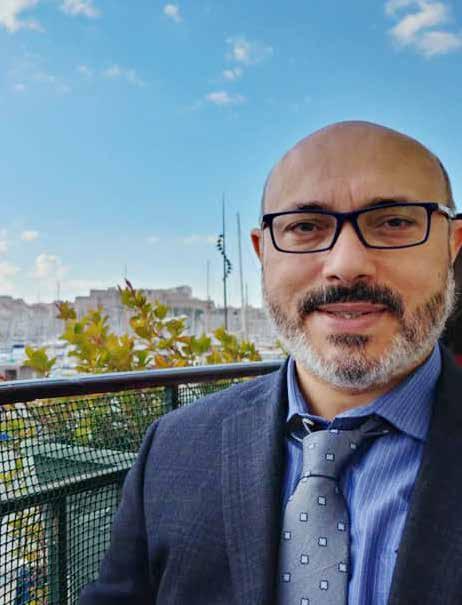
7 minute read
A
Ahmed Nabawi is an Egyptian poet and academic. He deals with humanitarian themes in his poetry. His poetic career began early in the nineties. He has five collections of poetry: (Testimony of Love), (Wounds Have Tributaries), (Flames of Questions), (Scenes from the Refugee Camp).(The Brilliance of Colors), and two collections in print entitled (An Ant Said - The Doors). In addition, he has a collection of critical books, including The Poet’s Culture and the Production of Significance - The Poetics of Small Details - The Contemplative Tendency in Andalusian Poetry - The Heritage Tributaries in Andalusian Poetry.
Translated from Arabic by Dr. Salwa Gouda. She is an Egyptian literary translator, critic, and academic at the English Language and Literature Department at Ain-Shams University. She holds a PhD in English literature and criticism. She received her education at Ain-Shams University and California State University in San Bernardino. She has published several academic books, including “Lectures in English Poetry, and “Introduction to Modern Literary Criticism” and others. She has also contributed to the translation of “The Arab Encyclopedia for Pioneers,” which includes poets and their poetry, philosophers, historians, and men of letters, under the supervision of UNESCO. Additionally, her poetry translations have been published in various international magazines.
Advertisement
A color and shades
There are clouds in the soul
That the two colors
Black and red remain
In the emblems of countries
He does not know
Where does sadness come from?
And how does it come?
And why does the thorn pricks
In the human heart?
****
He does not know
What is the secret of the overwhelming sadness
In the artist’s brush?
Does the color choose sadness
Out of its own free will
Or is it intentionally done by the brush?
And why does the tree of sorrow
Grow bigger in the painting?
And why does it appear in the east of the painting
Dreams behind bars
And a nostalgic woman in love
Who screams silently
Behind the walls?
And why is there a human being
Blurs with black
In violence
The flowers of his fellow man?
And to the north of the painting
A person who grows continued overleaf...
In monster form?
He always wonders in pain
From where?
And how does it enter us?
And why?
A color dominates the painting
Only one color.
***
All expats
There are clouds in the soul
All expats
No matter how different they are
And how did they travel
And where did their attention go
All expats are
Indigent people
They removed themselves
From the embrace of home
Or they were taken away
Against their will
When the restrictions on their hands became more severe or
When it broke
Within them
Colors of joy or
When the violence of hurricane
Threw them onto the vast land.
***
All expats are
Loving people
The humiliation of alienation disturbs them
And a never ending nostalgia
Towards the motherland
And a hidden red moan
Unmistakable
If you focus with their eyes.
*** continued overleaf...
All expats are Losers And oppressed And patriots
They left their houses reluctantly and anxiously They paid a lifetime
To leave a light for his fellow brother And to facilitate A way to earn a living And opens a window and a neighborhood.
All expats are Interval questions
Looking for answers
In the motherland And the motherland
Unfortunately Places them
On the sidelines
In a faded, worn-out memory
All expats are
Without exception
Revolutionaries
They took a stab
Followed by a stab but
Under a hopeful sky
They fold the heart over the wound And they go on.
All expats are humiliated
No matter how strong they look
They are weak
They have no stronghold to secure them
Nothing secures
Except the motherland
And the motherland
Unfortunately
Puts them on the margin
In a faded, worn-out memory.
Walid EL Khachab is an Egyptian poet, critic and academic at York University in Canada. He has published more than three poetry collections and several critical books. Walid Al-Khachab got the opportunity to work and complete his studies at a Canadian university. He gradually turned into an immigrant university professor, but this immigration did not sever his connection with the reality of cultural life in the Arab world, as he was active in many initiatives based on confirming the presence of Arab creative voices in and outside Canada.
Translated from Arabic by Dr. Salwa Gouda. She is an Egyptian literary translator, critic, and academic at the English Language and Literature Department at Ain-Shams University. She holds a PhD in English literature and criticism. She received her education at Ain-Shams University and California State University in San Bernardino. She has published several academic books, including “Lectures in English Poetry, and “Introduction to Modern Literary Criticism” and others. She has also contributed to the translation of “The Arab Encyclopedia for Pioneers,” which includes poets and their poetry, philosophers, historians, and men of letters, under the supervision of UNESCO. Additionally, her poetry translations have been published in various international magazines.
School Yard
I do not like going to school
Because Ashraf Wissa beats me
He runs to Madam Aida to complain to her
Because of the surprise, I do not defend myself
The injustice is terrible
The school yard is the first exercise in slander.
The fake raid
The most beautiful childhood memories after 1967
When my grandmother takes out the sprouted beans in the morning
So, I know that we will spend the night in a raid
We light the candles with anticipation
Yet we watch TV
I do not like TV-deprived evenings
I do not understand the difference between a power outage
And the imagined enemy raids
Our windows were blue
And its glass is sealed with tape
And the entrance to our building is hidden behind brick walls
And our city’s garages are the bunkers and basements of our homes as Well
When I was a kid, we used to spell letters
We learn the first words:
Dad... Mom... Raid... Bunker.
Palestinian children stand amid the rubble of destroyed buildings in Al-Bureij camp, Gaza, on October 29, 2023 following Israeli airstrikes. © 2023 Mohammed Talatene/picture-alliance/dpa/AP Images https://www.hrw.org/news/2023/11/22/israel/gaza-hostilities-take-horrific-toll-children
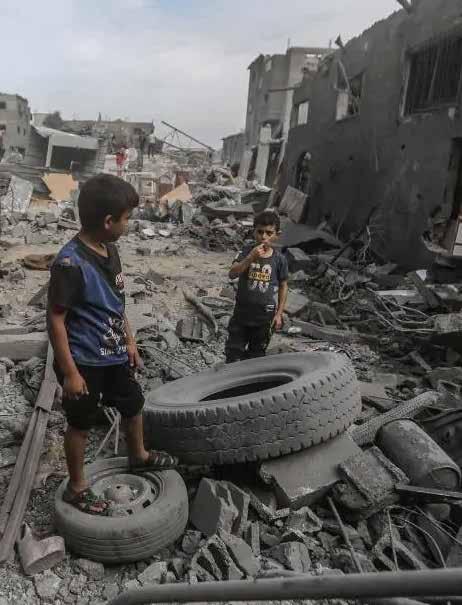
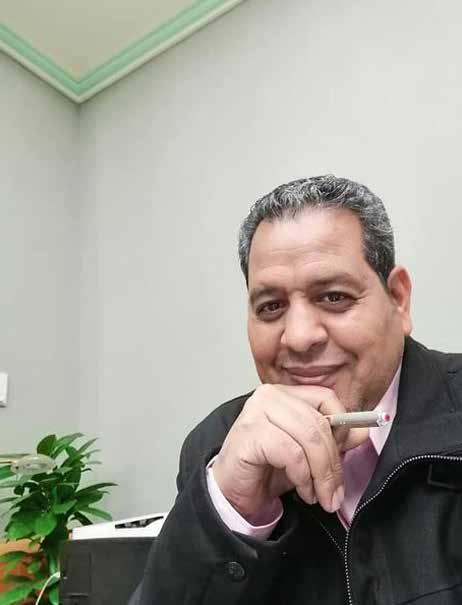
Abdullah Mohammed Al-Samati is an Egyptian poet, literary critic, and researcher. He published 14 poetry collections and 35 critical books. In addition, He worked in cultural journalism for more than 30 years for several Egyptian and Arab newspapers and magazines. He also participated in several poetry and criticism evenings and literary conferences in Egypt and the Arab world.
Translated from Arabic by Dr. Salwa Gouda. She is an Egyptian literary translator, critic, and academic at the English Language and Literature Department at Ain-Shams University. She holds a PhD in English literature and criticism. She received her education at Ain-Shams University and California State University in San Bernardino. She has published several academic books, including “Lectures in English Poetry, and “Introduction to Modern Literary Criticism” and others. She has also contributed to the translation of “The Arab Encyclopedia for Pioneers,” which includes poets and their poetry, philosophers, historians, and men of letters, under the supervision of UNESCO. Additionally, her poetry translations have been published in various international magazines.
Behind the involuntary mask of a daffodil
1
For the first time, I live. I illuminate the earth in the rib of air.
I see a silhouette Wearing me
I versify the throat of Nowruz; I call myself slowly and flee into my madness
Here
In the blind pleasure
Over the fence of astonishment of a folk singing bough
My silence chatters me
Here too
The metaphor of the wind, where I blow on a string I depart to me with the geography of nostalgia.
......
For the first time, I live.
......
2
Everything outside us is bad, if inside us is ugly, such is the world of certainty.
3
Here in my fingers are the stones of a universe that does not want to pounce Because my pulse is from my aorta
Here, with my first resurrection, I will drown a thousand seas in me
Like an ascension on the root of groaning
Here I extend like a nothingness opposite to the Hyle, where my essence is a maze Of my thoughts
In my humanity, a child would like existence to become his toy that contains My years.
4
I am behind the involuntary mask of a daffodil, which is arranging its well with the extent of my eyes.
5
I anxiously personalize the light of my things, and the shadows oppress me as if I will fall into an ambush.
For the first time, I live.
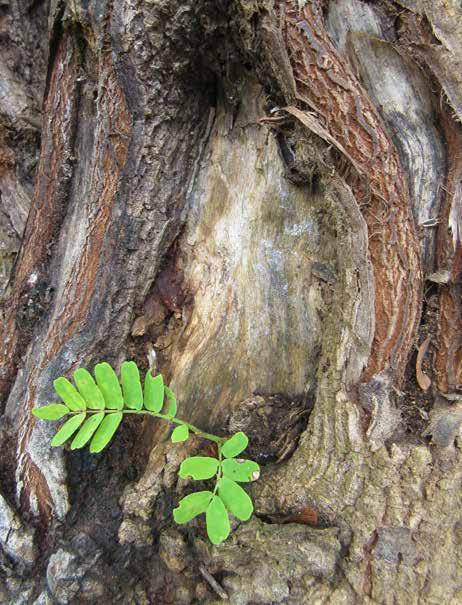
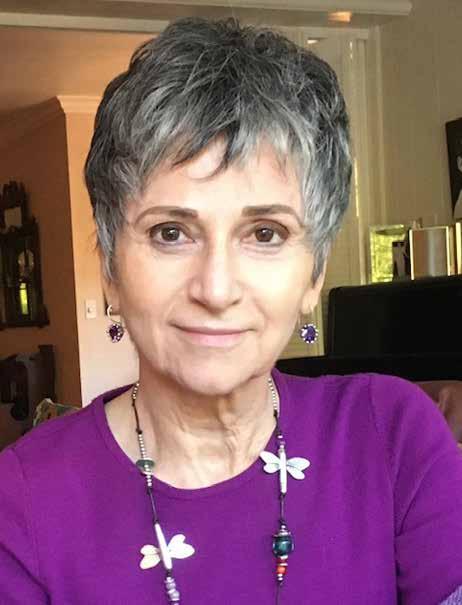
Alicia Viguer-Espert, born and raised in the Mediterranean city of Valencia, Spain, lives in Los Angeles. A three times Pushcart nominee, she has been published in Lummox Anthologies, Altadena Poetry Review, ZZyZx, Panoply, Rhyvers, River Paw Press, Amethyst Review, Odyseey.pm, and Live Encounters among others. Her chapbooks To Hold a Hummingbird, Out of the Blue Womb of the Sea and 4 in 1, focus on language, identity, home, nature, and soul. In addition to national and international publications, she is included in “Top 39 L.A. Poets of 2017,” “Ten Poets to Watch in 2018,” and “Bards of Southern California: Top 30 poets,” by Spectrum.
Breath
I start an angry conversation from my front steps to the altar of worry, reject carved wooden benches from church, the mundane and the gift of rational thinking, until your soft hand on my thigh whispers, enough, our love is wider, thicker, stronger than this mindless argument.
We inhale and suddenly I notice that vast space from where we take a breath of air, and what’s air but what ties the body to the soul? Once we stop, the soul is free to go, the body remains a pile of minerals incapable of soaring an inch from earth.
I continue glancing at this empty space full of oxygen, nitrogen, argon, other minor gases nobody remembers. Observe the pump of our lungs, assisted by noses of different shapes and colors carrying inside our bodies that ethereal sustenance natural to every living being.
And when after the fight calmness returns slowing down my heartbeat, my soul, like a timid but savvy child, comes out of the darkness of agitation to teach my breath the lithest of games which guides my sight into seeing what is beyond what I see.




